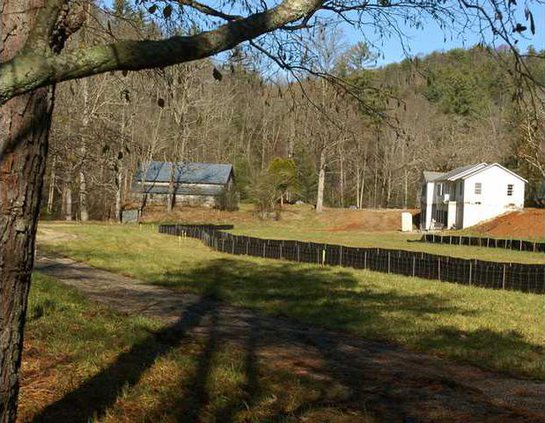1203Reece-Aud
Listen to an introduction about Byron Herbert Reece given by Former Atlanta Journal-Constitution editor Ralph McGill, as part of a video presentation called “Voices,” created in honor of Reece.Read more about the life and history of North Georgia’s unofficial poet laureate, Byron Herbert Reece. IN SUNDAY LIFE
BLAIRSVILLE — Officials broke ground Wednesday as part of the first phase of construction for the Byron Herbert Reece Farm and Heritage Center, a park on the former homestead of the North Georgia poet and novelist.
Born to simple farmers in the shadow of Blood Mountain outside Blairsville, Reece quickly took to poetry but struggled most of his life to earn a living that didn’t include farming. At one time a poet-in-residence at the University of California-Los Angeles and at Young Harris College, where he took classes for two years, Reece committed suicide in 1958 while suffering from tuberculosis.
But his legacy lives on in the four volumes of poetry and two novels he wrote before his death — and now in a new historic site dedicated to preserving his writing and teaching.
“This will be a historic site that will perpetuate the legacy of Byron Herbert Reece and demonstrate Appalachian lifestyle in the early 1900s,” said Fleming Weaver, a former president of the Chattahoochee-Oconee Forest Interpretive Association and one of the volunteers spearheading the project.
The property, about a mile north of Vogel State Park on U.S. 129, was purchased by Gainesville’s James Mathis Sr., who knew Reece and his work. Mathis later donated the property to the Chattahoochee-Oconee Forest Interpretive Association, which in recent years deeded the property to Union County.
Now, through a partnership that includes officials with Union County, the Byron Herbert Reece Society based at Young Harris College and a host of state and local volunteers, the property will finally see the purpose Mathis laid out for it when he first purchased it: As a place to honor Reece, while teaching about farm life in the early 1900s.
The first phase of construction will include a pavilion on the south side of the property — a place for family gatherings — along with a roadway, parking area, renovation of the visitors center and the base for “poetry plaza,” the brainchild of Gainesville architect Garland Reynolds.
The idea behind the plaza, Reynolds said, is to use Reece’s poetry to define four specific areas within the space, signifying the four seasons. It will be a place for large gatherings or personal introspection.
“I’m just pleased and happy to be a part of it,” said Reynolds, who has been a fan of Reece’s work for years and drew up the plans for the entire park.
John Kay, chairman of the Byron Herbert Reece Society, said the partnership between Union County and the society, a 501(c)3 nonprofit, allowed the organization to get enough grant money to finally start the project.
Local donations, along with grants from the Appalachian Regional Commission, OneGeorgia and the Georgia Department of Transportation, put the plan into motion.
“Finally, just this past month, the Georgia DOT gave us the green light to begin activity, so that is what brought us to this particular moment,” said Kay, a former professor at Young Harris College. “Which I have to tell you is truly a milestone event for not only Union County and the Byron Herbert Reece Society, but also for this entire region.”
With Vogel State Park right down the road and tourism coming to nearby White and Lumpkin counties, 8th District state Rep. Stephen Allison said the final product will be like only a few places in the country.
“Rarely do you have some type of historic site that actually contains more than one function,” he said during a news conference at the Union County Courthouse. “This interpretive center will not only hold an agricultural site, or the history of the region, but it will also let folks in on literature.
“Rarely, outside of the American Northeast, where Thoreau and Emerson were, has a historical society placed an emphasis on not only the region but also education and literature. It’s nice to see Appalachia finally get that in the form of this interpretive center.”

